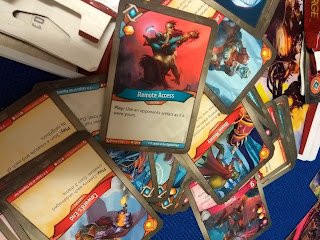First, I have a problem with the Deleuzian "new weird" type of argument, which treats the monstrous as merely monstrous from the position of the bourgeois ego, etc. Certainly there is some truth to this position. We could reread the end of The Shadow Over Innsmouth as the moment of Lovecraft's embrace of the monstrous and miscegenation against his racism.
"The tense extremes of horror are lessening, and I feel queerly drawn toward the unknown sea-deeps instead of fearing them. I hear and do strange things in sleep, and awake with a kind of exaltation instead of terror. ...
While this makes for good politics and some good fiction, much of the new weird, what can go missing is horror. Horror, in this reading, can only ever be momentary and needs to be surpassed by becoming. All becomings are good as such, as becomings, which I think is a bad dialectic (in lots of ways). We accept everything and potentially criticise nothing, after all it's a becoming baby...
The risk of the counter position, my position, is that it seems reactionary. To have or celebrate horror would seem to be conditioned by the kind of rejection of the Other found in Lovecraft. Racism conditions horror (I tend to agree with Houellebecq that, in the case of Lovecraft, racism does condition much of his horror, although his fiction does exceed that at times). Can we imagine a dialectical horror that would not simply condemn the Other or treat it as moment of becoming? If Walter Benjamin wrote of dialectical fairy tales, can we have dialectical horror tales?
I was wondering about John Carpenter's argument re The Thing (my favourite film). He suggests two modes of horror: one reactionary, where the horror is outside the circle (as we tell stories around the camp fire) and one more radical where the monster is sat around the fire. The inside horror would be the dialectical horror.
[Obviously we can also think of The Fog, in which we start with exactly such a scene of story telling and in which the film will reveal the horror as being a result of the crime of the founding of the community (although the revenge doesn't exactly seem to fall on those responsible or their descendants).]
The Thing is then a horror film of sociality and relations, and then the alien 'Thing'. It is a film of men in meetings, at which they have to decide 'who is who'. This is the horror of sociality, the stasis of the practico-inert in which they live from the start - simmering resentments and petty authority ('el capitano with his pop gun').
But the horror isn't only sociality, it is also the dialectic with the alien coming inside and the end of human civilisation (in 27,000 hours). This isn't a racist horror, in which the Other is feared as racial Other, but a horror of the inside. The dialectical moment is that horror that is inside in both senses, the implosion of the practico-inert in destructive violence that ends human life (the destruction of the camp) and the intrusion of 'the thing' into humanity to which the only solution is suicide, or waiting a while...
This is one, for me privileged example. I am tempted to also suggest Ligotti's abstraction of Lovecraft's great old ones to a cosmic 'dance' of decay and exhaustion also exhausts the localised racism of Cthulhu. Here, again, the outside and inside are rendered indistinguishable, as we are all puppets of the forces of the outside that are already inside. Here the abstract forces of decline (in some 'town'), seem also to be the forces of destitution of abstract capital and the forces of abstraction as moment of horror. Workplace horror, as in My Work Here is Done, is 'abstract labour' as the form of nothingness itself (as Marx suggests in The Economic and Philosophical Manuscripts - "the abstract existence of man as a mere workman who therefore tumbles day after day from his fulfilled nothingness into absolute nothingness".)
I am interested if you have other examples or think this is a reactionary position. I think a lot turns on the relation to the outside and hence, if it wasn't evident', I tend to reject the argument by Mark Fisher about the weird as intrusion of the outside (while of course feeling his loss). Dialectical horror is, precisely, horror of the mediation of inside and outside that resists us 'becoming outside'. In this sense, then, there is another political path to the new weird. A path through horror.
Much of the work of Blindfield has been devoted to the dialectical horror tale. This tentative effort by me is dedicated to that journal.






















